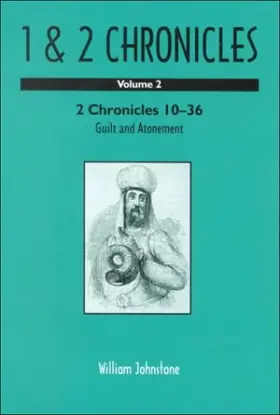

2 Chronicles 10–36: Guilt and Atonement
in Library of Hebrew Bible/Old Testament Studies
Pages
200 pages
Publisher
Sheffield Academic Press
Published
1997
ISBN-13
9781850756941
This two-part commentary argues that Chronicles, placed as it is among the 'historical books' in the traditional Old Testament of the Christian church, is much misunderstood. Restored to its proper position as the final book in the canon as arranged in the order of the Hebrew Bible, it is rather to be understood as a work of theology essentially directed towards the future. The Chronicler begins his work with the problem facing the whole human race in Adam-the forfeiture of the ideal of perfect oneness with God's purpose. He explores the possibility of the restoration of that ideal through Israel's place at the centre of the world of the nations. This portrayal reaches its climax in an idealized presentation of the reign of Solomon, in which all the rulers of the earth, including most famously the Queen of Sheba, bring their tribute in acknowledgment of Israel's status (Volume 1). As subsequent history only too clearly shows, however, the Chronicler argues (Volume 2), that Israel itself, through unfaithfulness to Torah, has forfeited its right to possession of its land and is cast adrift among these same nations of the world. But the Chronicler's message is one of hope. By a radical transformation of the chronology of Israel's past into theological terms, the generation whom the Chronicler addresses becomes the fiftieth since Adam. It is the generation to whom the jubilee of return to the land through a perfectly enabled obedience to Torah, and thus the restoration of the primal ideal of the human race, is announced.
Reviews
Vol. 1: 1 Chronicles 1 - 2 Chronicles 9: Israel's Place Among the Nations. Vol. 2: 2 Chronicles 10-36: Guilt and Atonement JSOTSup 253-54 Sheffield: Sheffield Academic Press, 1997. Pp. 411 (Vol. 1); 300 (Vol. 2), Cloth, No Price Available, ISBN 1850756945. John W. Wright Point Loma Nazarene University San Diego, CA 92106 Given the explosion of the academic study of the biblical text, classical critical philological commentaries have tended to become scribal affairs Unless the commentator is extremely diligent, contemporary scholarship, rather than the biblical text itself, becomes the main dialogue partner for the commentator--and the reader of the commentary. The length of commentaries grows, yet the biblical text itself becomes a more distant voice, submerged beneath the cacophony of contemporary discussions. William Johnstone seeks to avoid this dilemma is his 700 plus page commentary on 1 and 2 Chronicles by selectively engaging contemporary scholarship and essentially foregoing a scholarly apparatus as he presents his reading of Chronicles to his audience. Yet his intent is not to present a postmodern exercise in the ideology of reading; Johnstone seeks to write "the inductive description of the material in the work itself, written with as few preconceptions as possible about what the theme or themes may turn out to be" (vol. 1, p. 377). He methodically utilizes a concordance to trace the use of language within Chronicles and the rest of the Hebrew Bible, especially Leviticus, to construct "inductively" the message of the text, while comparing Chronicles to its Vorlage in Samuel--Kings. Johnstone helpfully summarizes his basic reading of Chronicles in introductions to each volume (vol.1, pp. 9-23; vol.2, pp. 9-20).
[Full Review]
